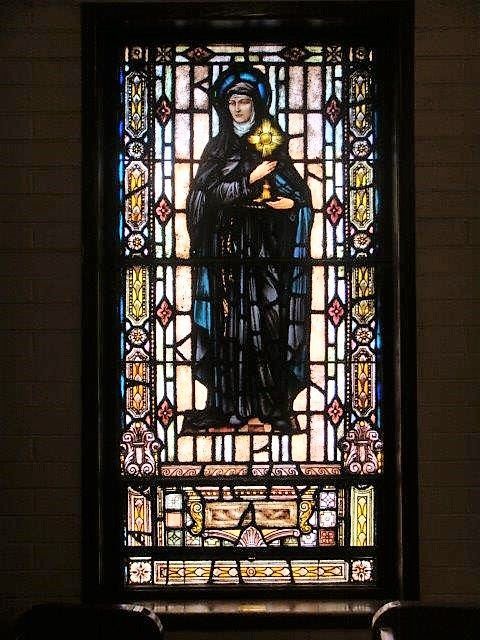St. Clare of Assisi
St Clare's window is on the left side, 3rd from the front of the altar.
St Clare was a beautiful Italian noblewoman who became the Founder of the order of nuns now called "Poor Clares". After hearing St. Francis of Assisi preach in the streets, her heart burned with a great desire to imitate St. Francis and to live a poor humble life for Jesus. One evening, she ran away from home, and gave herself to God. St. Francis cut off her hair and gave her a rough brown habit to wear, tied with a plain cord around her waist. St. Clare and her sisters wore no shoes, ate no meat, lived in a poor house, kept silent most of the time. Yet they were very happy because Our Lord was close to them all the time.
Once when she was very ill, her convent came under attack from soldiers, as they chose to attack Assisi through taking the convent first. St. Clare had herself carried to the wall and displayed the Blessed Sacrament in a monstrance to be seen by the enemies.

Then on her knees, she begged God to save her Sisters, "O Lord, protect these Sisters whom I cannot protect now," she prayed. A voice seemed to answer, "I will keep them always in My care." At the same time a sudden fright struck the attackers and they fled as fast as they could.
St Clare was sick and suffered great pains for many years, but she said that no pain could trouble her. So great was her joy in serving the Lord that she once exclaimed "They say that we are too poor, but can a heart which possesses the infinite God be truly called poor?"
Her Feast Day Aug.11
Born -July 16, 1194 at Assisi
Died -Aug 11, 1253
Canonized -Sept. 26, 1255 by pope Alexander IV
Patronage -Embroiderers, eye disease, laundry workers, needle workers, telephones, televisions, and television writers (Toward the end of her life when she was too ill to attend Mass, an image of the service would be displayed on her wall)
Her stained-glass window shows her holding the blessed sacrament in a monstrance. This represents the time she used it to defend her convent against the enemies, and her trust that she had in our Lord (body, blood soul and divinity) in the eucharist.





